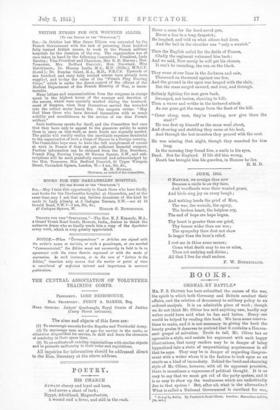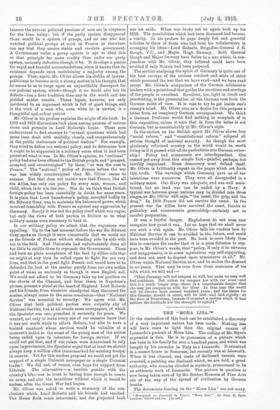BOOKS.
ORDEAL BY BATTLE.*
Mn. F. S. OLIVER has here submitted the causes of the war, the spirit in which both Germany and Britain conduct their affairs, and the relation of democracy to military policy to an ordered analysis. It is an admirable piece of work ; though we do not think Mr. Oliver has said anything new, hardly any writer could have said what he has said better. Every one would be helped by reading this book. We have some reserva- tions to make, and it is not necessary in giving the book the hearty praise it deserves to pretend that it contains a Heaven- sent gospel of salvation, Truth to toll, Mr. Oliver has so agreeable a style, and assists his argument with such happy illustrations, that many readers may be in danger of being hypnotized into a state of unquestioning acquiescence in all that he says. They may be in danger of regarding disagree. ment with a writer whom it is the fashion to look upon as an oracle as a kind of immodesty. Behind the lucid and charming style of Mr. Oliver, however, with all its apparent precision, there is sometimes a vagueness of political thought. It is so easy to say that we must get rid of the party system, and it is so easy to show up the weaknesses which are undoubtedly due to that system ! Pitt, after all, what is the alternative P What is called a National Government is excellent for war,.
• Ordeal by Battle. By Frederick Scott Oliver. Louden : Macmillan and CO. Les. net.]
because the natural political passions of men are in abeyance for the time being ; but if the party system disappeared there would be a system of groups, and no one who has watched political groups at work in France or elsewhere can say that they ensure stable and resolute government. A Government under a group system is apt to shed this or that principle far more readily than under our party system, seriously defective though it be. It develops a genius for rapid and fanciful accommodations, since it knows that its existence depends upon maintaining a majority among the groups. Then, again, Mr. Oliver allows his dislike of lawyer- politicians to become such a strong motive in his thought that he seems to us to verge upon an unjustifiable disrespect for our judicial system, which—though it no doubt also has its defects—has a finer tradition than any in the world, and has yielded nobler results. These lapses, however, are only incidental to an argument which is full of good things, and is the work of a man who, even when he is unwise, is a thoughtful and ardent patriot.
Mr. Oliver in his preface explains the origin of his book. In 1912 and 1913 discussions took place among persons of various views and pursuits in Lord Roberts's house. These men endeavoured to find answers to "several questions which had never been dealt with candidly, clearly, and comprehensively in the public statements of political leaders." For example, they tried to define our national policy, and to determine how it ought to be supported in a military sense when it had been perceived what it was. In Mr. Oliver's opinion, no "national" policy had ever been offered to the British people, and " grasped, accepted, and countersigned" by them, " as was the case in France." The "national" policy of France before the war was less widely countersigned than Mr. Oliver seems to assume. But that does not matter now that France, like all the Allies, has only one policy for every man, woman, and child, which is to win the war. Nor do we think that British foreign policy has been essentially in doubt for some years. It is plain that Lord Lansdowne's policy, accepted bodily by Sir Edward Grey, was to maintain the balance of power, which involved friendship with France as against any aggression by Germany. Surely it was not the policy itself which was vague, but only the views of both parties in Britain as to what military means were necessary to back it.
In our military policy we admit that the vagueness was appalling. Up to the last moment before the war Sir Edward Grey spoke as though it were conceivable that we could act as the friends of France without standing side by side with her in the field. And Unionists had unfortunately done all too little to entitle them to reproach the Government. There had been no plain acceptance of the fact by either side that we might at any time be called upon to fight for our very lives, and that in the great fight French soil would have to be defended (to look at the matter purely from our own selfish point of view) as zealously as though it were English soil. We could not afford to let Germany take up her position on the shores of the Channel, and from there, in Napoleon's phrase, present a pistol at the heart of England. Lord Roberts and his friends, from whatever standpoint they discussed the matter, always came to the same conclusion—that " National Service" was essential to security. We agree with Mr. Oliver that both political parties were culpably shy of National Service, but at all events some newspapers, of which the Spectator was one, preached it earnestly for years. We wanted, not only to make every one of our enemies know that it was not worth while to attack Britain, but also to have a trained manhood whose services would be valuable at a moment's notice in the event of the young men of the nation being called upon to volunteer for foreign service. If we could not get that, and if our rulers were determined to rely upon improvisation, the Spectator urged that at least we should always keep a million rifles (unearmarked for existing troops) in reserve. Yet for this modest proposal we could not get the support of a single Unionist newspaper or a single Unionist leader l We did not, of course, even hope for support from Liberals. The alternative --a terrible gamble with the country's life—was to trust to having time enough to create an army, and also the munitions without which it would be useless, after the Great War had begun.
Mr. Oliver was asked to write a summary of the con- clusions which Lord Roberts and his friends bad reached. The Home Rule crisis intervened, and the projected book was set aside. When war broke out be again took up his MSS. The possibilities which had been discussed had become a reality. In his preface he pays deeply felt and graceful tributes to three of those who had been his collaborators in arranging his ideas—Lord Roberts, Brigadier-General J. E. Gough, V.C., and Major Hugh Dawnay. Both General Gough and Major Dawnay have fallen in a war which, in con- junction with Mr. Oliver, they believed could have been avoided if only Britain had been prepared.
The section analysing the spirit of Germany is quite one of the best surveys of the curious conduct and state of mind which procured the war that we have read—and we have read many. Mr. Oliver'e comparison of the German militaristic leaders with a priesthood that guides the emotions and cravings of the people is excellent. Excellent, too, light in touch and penetrating, is the presentation of the German case from the German point of view. It is wise to try to get inside one's enemy's mind. Mr. Oliver uses as a device for this purpose a letter from an imaginary German correspondent. We think a German Professor would find nothing to complain of in this exposition, unless it were that in form the letter is not German, but is unmistakably in Mr. Oliver'. style.
In the section on the British spirit Mr. Oliver shows bow "social reform" and "constitutional reform" eclipsed all serious thought of national security. As though the most gloriously reformed country in the world would be worth living in if it passed with all its perfections into German owner- ship 1 Policy and armaments are interdependent. One cannot got away from this simple fact—painful, perhaps, but terribly important. Even democracy must defend itself. Mr. Oliver is brilliantly cogent in the pages which set forth this truth. The warnings which Germany gave us of her intentions were numerous. They were all disregarded in a military sense. Our Navy was adequate, and was well main- tained, but no land war can be ended by a Navy. A typical war between great nations may be divided into three stages, as Mr. Oliver well says, " the onset, the grip, and the drag." In 1870 France did not survive the onset. In the present war the Allies have survived the onset, thanks to gallantry and consummate generalship—certainly not to careful preparation.
It was a fearful danger. Englishmen do not even now recognize how great it was. Let us hope that we shall never run such a risk again. Mr. Oliver tells his readers how by National Service it can be avoided in the future, and could have been avoided in the past. No book is more likely than this to convince the reader that it is a pure delusion to sup- pose, in Mr. Oliver's words, that "policy, if only it be virtuous and unaggressive, is in some mysterious way self-supporting, and does not need to depend upon armaments at all." Mr. Oliver wants National Service now, and he makes the demand in no panic. That may be seen from three sentences of his with which we will end
--- "That Germany will not conquer us with her arms we may well feel confident. But unless we conquer her with our arms—and this is a much longer stop—there is a considerable danger that she may yet conquer us with her ideas. In that case the world will be thrown back several hundred years ; and the blame for this disaster, should it occur, will be laid—and laid rightly—at the door of Democracy, because it vaunted a system which it had neither the fortitude nor the strength to uphold."











































 Previous page
Previous page